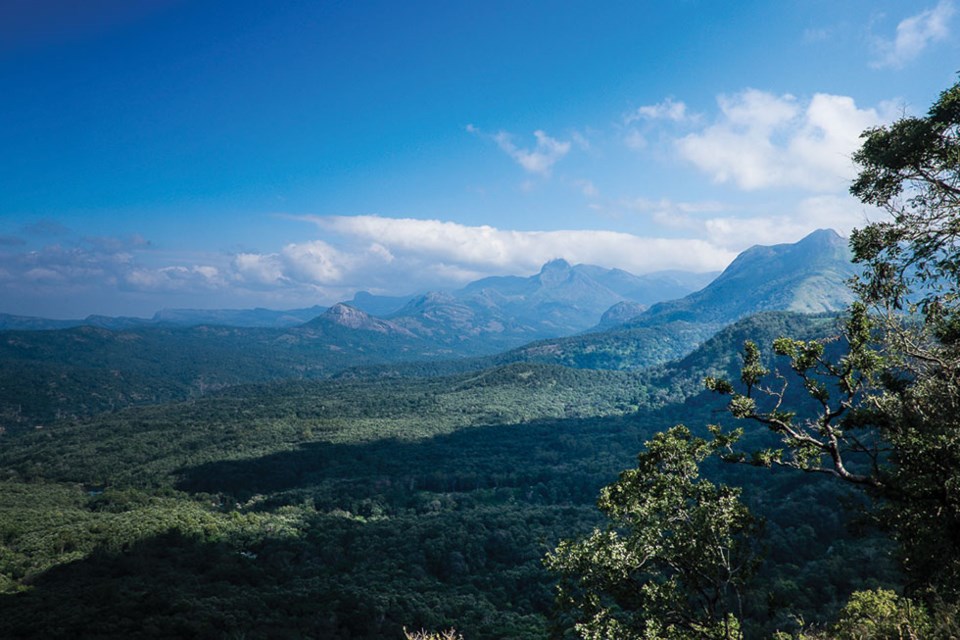The Idukki District of Kerala can be described in three words: mountains, tea, and spices. The verdant Western Ghat Mountains are home to everything you ever saw in a spice shop. Pepper, “the King of Spice,” cardamom, “the Queen of Spice,” ginger, clove, turmeric, cinnamon, tamarind, nutmeg, and way more. Tea is the lifeblood of the economy and immaculately manicured plantations extend as far as the eye can see.
On a motorcycle, you smell everything, and each passing spice plantation emits a unique aromatic sensory experience. Add great roads and impressive scenery and stir in friendly, educated people interested in discussing all sorts of topics.
Kerala has been a communist state since 1970, boasting the most active political population in the country. Beneath “Hammer and Sickle” flags lie a progressive state, the first in India to openly accommodate the transgender community.
We stop in Thadiyampadu, close to the takeoff point for a hike up Palkulamedu Mountain. According to the Kerala Trekking Club, this peak is far from tourist routes and all we need is water and “sturdy walking sandals.”
The narrow road to the trailhead is lined with cashews. Parking next to a cow shed, a farmer pokes his head out to say “hello.” We leave the bikes and gear under the watchful guard of four cows, following a path up above the tree line. Endless views of the shola (grassland forests) and mountains are the reward.
The twisting highway to Munnar, the capital of the tea district, is punctuated with lakes and rivers. Private tea plantations limit route options to state roads and none of the tempting tracks that lead through the private estates.
A quiet homestay on the outskirts of Munnar is home for three nights. Walking about town, we see tourists for the first time, the tea estates and nearby national parks are a big draw. The tourist office warns independent hiking is forbidden; a guide and entrance fee is required. We were shown disappointing tourist “programs” and left disgruntled.
My travel companion Astried’s birthday was celebrated with an adventure into the Kannan Devan Hills. Passing the highest tea plantations in the country we reach “Top Station,” a historic tramway sending tea down the mountain to the railhead below.
We found the trailhead—minus the checkpoint —and descended into the lush forest. A lone rooster guarded the track but demanded no fee. Two hours later, we were back, sipping chai and munching fresh oranges. Astried was angry at the dishonest tourist officials but elated to walk unguided.
Eravikullam National Park forbids hiking near 2,69-mere Anamudi Mountain, the highest peak in India south of the Himalayas. We passed the busy entrance and spotted a road without a “No Trespassing” sign. Shortly further on, a young man appeared, telling us it was private property.
“Very sorry sir”, I said. “There was no sign.”
“That’s because the elephants came through last night and knocked it down,” he chuckled.
We learned the 1,500-hectare plantation has 24 varieties of ISO certified tea harvested every three weeks. Waving goodbye, we descended to Munnar.
Perfect weather the next morning made for a brilliant ride down the mountains. The checkpoint entering Chinnar Wildlife Sanctuary had more monkeys than people. They loitered on the gate, hoping for food scraps, and leaped onto the hoods of cars. Elephant dung was scattered along the road underscoring the “Caution:Elephant Crossing” signs.
Stopping for “meals” at Meghna Hotel in Manupatti village, we asked if they saw many foreigners.
“They sometimes pass through in cars,” he said, “but you are the first who have ever stopped and the first foreigners on motorcycles I have ever seen.”
At a chai stall in tiny Puruvur village, Astried attracted attention. They had never seen a blond woman, let alone riding a motorcycle. A cluster of women gathered, and one old woman sat close to Astried holding her hand tenderly. She told stories as though we understood and clearly did not want us to go. Climbing aboard the bikes, she hobbled over to Astried with a tear in her eye and gave her a kiss, saying what could have only been “take care.”
We sailed along flat, straight roads to Aliyar Dam and started climbing into the Nilgiri Mountains on another exhilarating numbered hairpin highway. The Anamalai—“Elephant Hill”—region is home to elephant, tiger, panther, Indian bison, langur, deer, gaur, sloth and more. Tea plantations and thick forests drown the hills in greens as we reach the town of Valparai for the night. Our amazing journey continues …
For 28 days and more than 2,600 kilometres, Tim and his companion explored rural Tamil Nadu and Kerala (in 2017). Few foreigners ride the back roads of southern India and they certainly attracted a lot of attention, from chai-stall stares to schoolchildren’s cheers and even newspaper coverage. Read more of the series on piquenewsmagazine.com and timmorch.com.




